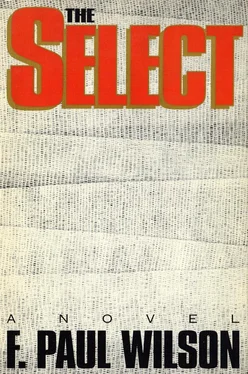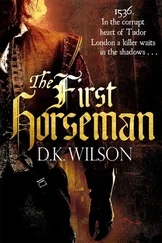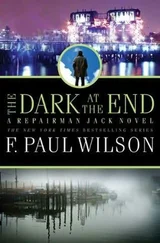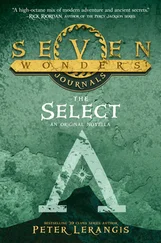F. Wilson - The Select
Здесь есть возможность читать онлайн «F. Wilson - The Select» весь текст электронной книги совершенно бесплатно (целиком полную версию без сокращений). В некоторых случаях можно слушать аудио, скачать через торрент в формате fb2 и присутствует краткое содержание. Жанр: Старинная литература, на английском языке. Описание произведения, (предисловие) а так же отзывы посетителей доступны на портале библиотеки ЛибКат.
- Название:The Select
- Автор:
- Жанр:
- Год:неизвестен
- ISBN:нет данных
- Рейтинг книги:4 / 5. Голосов: 1
-
Избранное:Добавить в избранное
- Отзывы:
-
Ваша оценка:
- 80
- 1
- 2
- 3
- 4
- 5
The Select: краткое содержание, описание и аннотация
Предлагаем к чтению аннотацию, описание, краткое содержание или предисловие (зависит от того, что написал сам автор книги «The Select»). Если вы не нашли необходимую информацию о книге — напишите в комментариях, мы постараемся отыскать её.
_________________
The Select — читать онлайн бесплатно полную книгу (весь текст) целиком
Ниже представлен текст книги, разбитый по страницам. Система сохранения места последней прочитанной страницы, позволяет с удобством читать онлайн бесплатно книгу «The Select», без необходимости каждый раз заново искать на чём Вы остановились. Поставьте закладку, и сможете в любой момент перейти на страницу, на которой закончили чтение.
Интервал:
Закладка:
"But back to our elderly baby boomers: Who is going to supply their enormous demand for medical care? That demand will eat up a proportionally enormous portion of the GNP. The national debt was one trillion in 1980. It is now approaching five trillion. Who can guess what it will be by the time the twenty-first century rolls in? Who is going to pay for all that medical care? In an ideal world, it would be no problem. But in this world, the real world, choices will have to be made. In the real world there are winners and losers. Some will get their transplant, their endarterectomy, their chance to resume a normal life; others will not. Who will decide? Who'll be making the list and checking it twice, deciding which ones receive a share of the finite medical resources available, and which ones do not?
"Is that playing God? Perhaps. But someone must make the decisions. Ultimately the guidelines will be drawn up by politicians and administered by their bureaucrats."
Tim lent his groan to the others arising from all sides of the lecture hall. Dr. Alston raised his arms to quiet them.
"But you can have a say. Ultimately you will have a say. Often the final say. Look at the tacit decision you all made this morning. How many of you considered the homeless woman for the transplant?"
Tim scanned the hall from his rear seat. Not a hand went up.
Dr. Alston nodded slowly. "Why not, Mr. Jessup?"
Jessup started in his seat like he'd been shocked. "Uh...I...because it seemed the other candidates could put the transplant to better use."
"Exactly! Societal worth is a factor here. There are individuals who give much more to the human community than they receive, and there are those who put in as much as they take out. And then there are those who contribute absolutely nothing but spend their entire existence taking and taking. In the rationing of medical resources, what tier should they occupy? Should they be classed with the hard-working majority where they can siphon off valuable health care resources in order to continue their useless lives at the expense of the productive members of society?"
"No one's completely useless," said a female voice. Tim recognized it as Quinn's.
Good for you, babe.
Dr. Alston's eyes gleamed. "How right you are, Miss Cleary. And someday it might fall to you to help these people become useful, to guide them toward making a contribution to the society they've sponged off for most of their lives. But more on that another time. The purpose of this course is to give you the tools, the perspectives to make the monumental moral and ethical choices which will become an everyday part of medical practice in the future."
So saying, Dr. Alston had ended his introductory class in Medical Ethics. Tim had felt intellectually alive for the first time since classes had begun. He'd vowed then never to miss one of these classes.
He was remaining true to that vow this morning, hangover and all.
WHERE ARE THEY NOW?
Quinn and Tim had stopped before the huge pin board in the main hall of the Administration Building, the companion to the one in the caf. She'd glanced at the display in passing on a daily basis, but this was the first time in a while she'd stopped to look at the list of graduates of which The Ingraham seemed the proudest. Tim stopped beside her.
As she read through the names and their locations all across the country, she was impressed at how far and wide the Ingraham's graduates had spread from this little corner of Maryland. They ran inner-city clinics or nursing homes from Los Angeles to Lower Manhattan to Miami, Chicago, Houston, Detroit, and all points between. And all were active staff members of a KMI medical center which was never far away.
A thought struck her.
"Doesn't anybody come out of The Ingraham and practice medicine in the suburbs?"
"Maybe," Tim said. "But I don't think they're listed here."
"Weird, isn't it," she said as they walked on. "Dr. Alston's always talking about ranking patients according to societal value, and the way he talks you'd figure he'd place inner-city folks at the bottom of the list. But here you've got all these Ingraham graduates spending their professional lives in inner-city clinics."
She couldn't say exactly why, but somehow the "Where Are They Now?" board gave her a vaguely uneasy feeling.
THE WORLD'S LONGEST CONTINUOUS
FLOATING MEDICAL BULL SESSION
(I)
"Not tonight," Quinn told Tim as he tried to get her to sit in on the bull session when it moved into his room. "I've got to crunch Path."
"Lighten up or you'll wind up like Metzger," said a second-year student she didn't know.
"Who's Metzger?" Quinn said.
"Someone from our year. He studied so hard he began hearing voices in his head. Went completely batty."
"Or how about that guy in the year before us?" said another second-year. "The guy who went over the wall. What was his name?"
"Prosser," said the first. "Yeah. Work too hard and you might pull a Prosser."
"What does that mean?" Quinn said.
"One night he upped and left. Vanished without a trace. No one's heard from him since."
"Okay," Quinn said. "I'll stay. But not too long."
"All right!" Tim said, making room for her beside him. "Where were we?"
It was some sort of tradition. No one knew how it got started, but it had been going as long as anyone could remember. The floating bull session, wandering from room to room, from floor to floor, changing personnel from night to night, hibernating during class hours and sleep time, but reawakening every night after dinner to pick up where it had left off.
Quinn rarely got involved in the sessions; she had too much work to do, always seemed just on the verge of—but never quite—catching up. But when she did sit in, the topic almost always gravitated toward Dr. Alston's lectures. Like tonight.
"I was up," Judy Trachtenberg said. "I was just saying that if rationing of medical services is inevitable, maybe the elderly should be put at the ends of the waiting lists."
"Sure," Tim said. "I can just see you telling your grandmother she can't have that hip operation because she's over 75."
"So, I'd find away to squeeze her in," Judy said with an expressive shrug.
Her casual attitude offended Quinn. As much as she wanted to avoid getting mired in one of these endless conversations, she had to speak.
"Either you believe in what you're proposing or you don't," she said. "You can't say this is how we're going to do it, these are the rules and they apply to everyone equally—except my friends and family."
Judy laughed. "Quinn, where have you been for the past thousand years? This is the way the world works. What you know is nowhere near as important as who you know."
Quinn felt herself reddening but pressed on.
"But then you run into the corruption of the magnitude of old USSR-style Communism, where the size of your apartment and the amount of meat on your plate depended on how buddy-buddy you were with the local commissar. I don't think that kind of system is the answer."
"Well, we need some kind of system," Judy said. "Like a national health insurance program that will keep costs down so we can distribute the services as broadly as possible."
"And end up like the Brits?" Tim said. "No thanks. Their system is broke and they're already rationing care to the elderly. A million people on waiting lists. Nobody over 55 gets dialysis. Chemotherapy and coronary bypasses are strictly rationed too. That's pretty cold. That kind of system seems to insure that everyone gets some health care but no one gets great health care. And I'm one hundred per cent against rationing."
"So am I," Judy said. "But since I don't plan to practice in Shangri-La, what do we do when we can't treat everybody on demand?"
Читать дальшеИнтервал:
Закладка:
Похожие книги на «The Select»
Представляем Вашему вниманию похожие книги на «The Select» списком для выбора. Мы отобрали схожую по названию и смыслу литературу в надежде предоставить читателям больше вариантов отыскать новые, интересные, ещё непрочитанные произведения.
Обсуждение, отзывы о книге «The Select» и просто собственные мнения читателей. Оставьте ваши комментарии, напишите, что Вы думаете о произведении, его смысле или главных героях. Укажите что конкретно понравилось, а что нет, и почему Вы так считаете.












